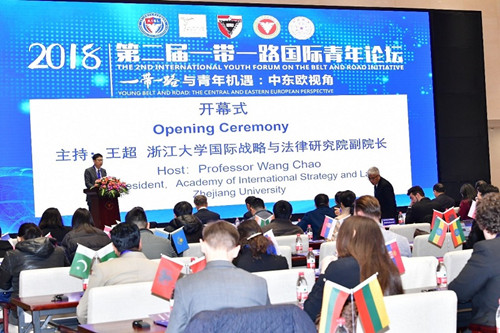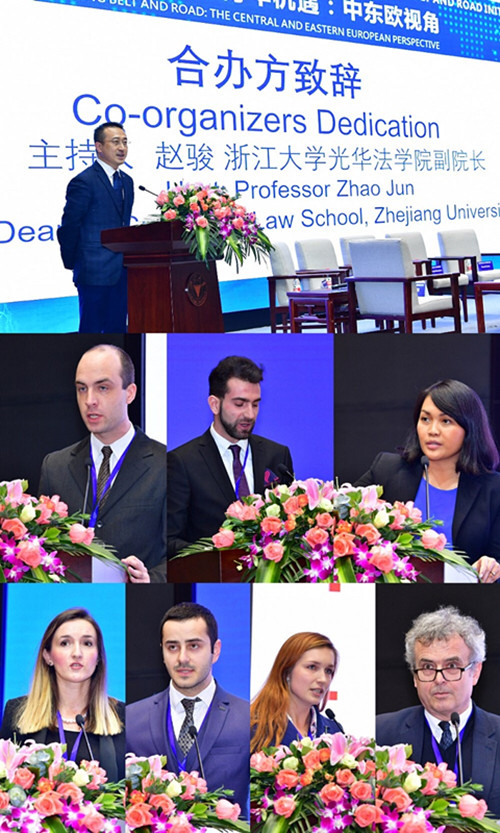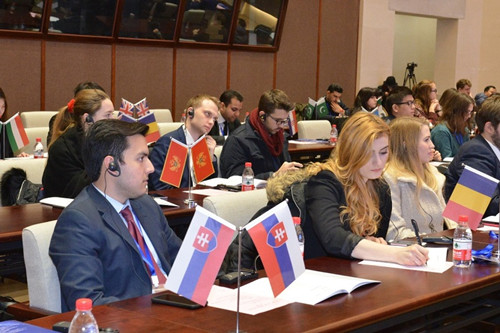The second International Youth Forum on the Belt and Road Initiative was held at Zhejiang University from December 28th to 29th, 2018. The theme was “‘the Belt and Road’ and Youth Opportunities: from the Perspective of Central and Eastern Europe”.

During the opening ceremony, Professor Zheng, deputy secretary of the ZJU party committee, put forward that Zhejiang University is located at the important intersection of the “Belt and Road” and the Yangtze River Economic Belt. Therefore, it is the unshirkable responsibility for Zhejiang University to undertake the new mission of building the Belt and Road Initiative. ZJU will focus on the new requirements of international cooperation and exchange on the Belt and Road, so as to build an educational community on a larger scale, and at a higher and deeper level. He hoped that in the future there would be more opportunities for young people to approach the law, which helped them to become the backbone of the society and the country.
Shen Deyong, Former Executive Vice President of the Supreme People’s Court, proposed four key words: “Global Vision”, “Historic Mission”, “Inclusive Spirit” and “Rule of Law”. First, young people should raise global awareness to understand, think, practice, and fully realize that the Belt and Road Initiative is a new opportunity that China provides to the world. Second, the B&R Initiative is a great practice for the youth to build a community of shared destiny for humankind. Third, young people should be committed to promoting mutual respect and harmonious coexistence among different civilizations, and building a bridge of cultural exchange to enhance the friendship among people of all countries. Finally, all-round cooperation in the fields of legal systems, legal culture, legal education and services are supposed to be enhanced to promote law capacity and personnel training as well as the building of the legal information and exchange mechanisms.
Xie Shuangcheng, Vice Mayor of the Hangzhou City, introduced the achievements in and visions of participating in the Belt and Road Initiative. The holding of the international youth forum fully demonstrated the role of Zhejiang University and the Hangzhou City in the practical exploration and theoretical research on the B&R Initiative. He hoped that young students could also gather ideas and provide suggestions for its building.
Representatives of co-organizers of the forum delivered speeches separately. Professor Zhou proposed five ideas of personnel training, cultural understanding, foreign aid systems, people-to-people bonds and educational diplomacy. Professor Wang focused on seeking common ground and making common solutions. President Li emphasized the role of the Supreme People’s Court in the building of the Belt and Road dispute settlement mechanisms. Gary Jay Kaufman, a representative of the Kaufman Law Firm, paid attention to the effect of communication and diversity.
Besides, every representative of co-organized educational institutions introduced their own universities or research institutes, and expressed their aspiration that with the help of the Belt and Road Initiative, they could work together with Chinese partners to build more platforms for cooperation and exchange among young people of all countries. These institutions include Vilnius University, Croatian Institute of Development and International Relations, Czech Metropolitan University, Sarajevo International University of Bosnia and Herzegovina, Serbia Research Associate Institute of International Politics and Economics, etc.

From the 28th to the 29th, young leaders from more than 10 countries including Poland, Czech Republic, Slovakia, Hungary, Slovenia, Croatia, Romania, Bulgaria, Serbia, Montenegro, Macedonia, Bosnia and Herzegovina, Albania, Estonia, Lithuania, Latvia, as well as more than 100 young representatives from famous universities in mainland China and Hong Kong, conducted a discussion on “‘the Belt and Road’ and Youth Opportunities from the Perspective of Central and Eastern Europe”. The discussion can be divided into four parts. The first part is about “16+1 Cooperation Framework”. The second part focuses on “The Future Development of the Balkans” and the third part on “Youth and Culture”. The fourth part talks over “Technology and Business”. In each part, the youth representatives of Central and Eastern European countries delivered speeches on their own countries’ politics, economy, laws, culture and their relationship with the “Belt and Road” Initiative, as well as their difficulties and suggestions. Representatives of Chinese students also expressed their views on relevant issues. During the talks and free discussions, the youth from various countries aroused a heated discussion on the above issues.



